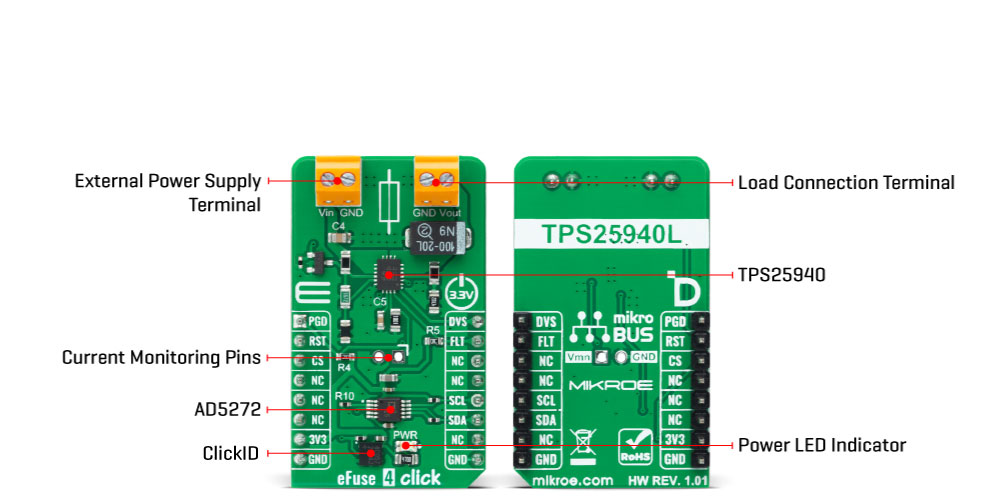OFF
GO LOCAL
| Company | Stock | Price |
|---|---|---|

MIKROE-5501
19 g
Status:
eFuse 4 Click is a compact add-on board with a power path protection solution that limits circuit currents and voltages to safe levels during fault conditions. This board features the TPS25940, an eFuse power switch with reverse current blocking from Texas Instruments. The TPS25940 features a full suite of protection and monitoring functions, including a DevSleep™ mode that supports compliance with the SATA™ Device Sleep standard. The wide operating range from 2.7V to 18V allows control of many popular DC bus voltages. The additional potentiometer sets the overload and short-circuit current limit of the TPS25940, while the additional header allows external current monitoring. This Click board™ is suitable for systems with load-side holdup energy that must not drain back to a failed supply bus.
eFuse 4 Click is fully compatible with the mikroBUS™ socket and can be used on any host system supporting the mikroBUS™ standard. It comes with the mikroSDK open-source libraries, offering unparalleled flexibility for evaluation and customization. What sets this Click board™ apart is the groundbreaking ClickID feature, enabling your host system to seamlessly and automatically detect and identify this add-on board.
This product is no longer in stock
Availability date:
OFF
| Company | Stock | Price |
|---|---|---|

eFuse 4 Click is based on the TPS25940, a smart eFuse with integrated back-to-back FETs and enhanced built-in protection circuitry from Texas Instruments. The TPS25940 provides robust protection for all systems and applications powered by an external power supply from 2.7V to 18V. It also features a full suite of protection and monitoring functions, including a low-power DevSleep™ mode, controllable through a DVS pin routed on the PWM pin of the mikroBUS™ socket, that supports compliance with the SATA™ Device Sleep standard.

This Click board™ is designed to protect systems such as enterprise SSD drives against sudden power loss events. It monitors voltages of the input and output terminals to provide true reverse blocking from the output when a reverse condition or input power fail condition is detected. The TPS25940 allows users to program the overcurrent limit threshold between 1A and 5A via an external I2C-configurable digital potentiometer, the AD5272 from Analog Devices. Besides the overcurrent feature, the TPS25940 is also equipped with programmable over and undervoltage thresholds for load, source and device protection.
The TPS25940 also provides an additional power good comparator on the PGD pin, routed on the AN pin of the mikroBUS™ socket, with precision internal reference for output or any other rail voltage monitoring and a fault event indicator on the FLT pin. This fault indicator goes to a low logic state to indicate fault condition due to under/overvoltage, reverse voltage and thermal shutdown event in the event of an overcurrent. A special addition on the plate represents an unpopulated header which represents a precise current monitor output for health monitoring of the system, alongside Enable pin routed on the RST pin of the mikroBUS™ socket that controls the ON/OFF state of the internal TPS25940’s FETs.
This Click board™ can be operated only with a 3.3V logic voltage level. The board must perform appropriate logic voltage level conversion before using MCUs with different logic levels. However, the Click board™ comes equipped with a library containing functions and an example code that can be used as a reference for further development.
Type
Power Switch
Applications
Can be used for systems with load-side holdup energy that must not drain back to a failed supply bus
On-board modules
TPS25940 - eFuse power switch from Texas Instruments
Key Features
Reverse current blocking, DevSleep support for SSDs, wide operating voltage, programmable current limit, current monitoring, protection features, power-good and fault indicators, and more
Interface
I2C
Feature
ClickID
Compatibility
mikroBUS™
Click board size
M (42.9 x 25.4 mm)
Input Voltage
3.3V
This table shows how the pinout on eFuse 4 Click corresponds to the pinout on the mikroBUS™ socket (the latter shown in the two middle columns).
| Label | Name | Default | Description |
|---|---|---|---|
| LD1 | PWR | - | Power LED Indicator |
| J1 | - | Unpopulated | Current Monitor Header |
| Description | Min | Typ | Max | Unit |
|---|---|---|---|---|
| Supply Voltage | - | 3.3 | - | V |
| External Power Supply | 2.7 | - | 18 | V |
| Output Current | 1 | - | 5 | A |
We provide a library for the eFuse 4 Click as well as a demo application (example), developed using MIKROE compilers. The demo can run on all the main MIKROE development boards.
Package can be downloaded/installed directly from NECTO Studio Package Manager (recommended), downloaded from our LibStock™ or found on MIKROE github account.
Library Description
This library contains API for eFuse 4 Click driver.
Key functions
efuse4_set_current_limit eFuse 4 set current limit function.
efuse4_set_resistance eFuse 4 set resistance function.
efuse4_set_digi_pot eFuse 4 set normal mode function.
Example Description
This library contains API for the eFuse 4 Click driver. This driver provides the functions to set the current limiting conditions in order to provide the threshold of the fault conditions.
void application_task ( void )
{
static char index;
if ( EFUSE4_ERROR != log_read( &logger, &index, 1 ) )
{
if ( ( index >= '0' ) && ( index <= '6' ) )
{
efuse4_set_current_limit ( &efuse4, limit_value_op[ index - 48 ] );
log_printf( &logger, " >>> Selected mode %d rn", index - 48 );
log_printf( &logger, " Current limit is %d mA rn", limit_value_op[ index - 48 ] );
log_printf( &logger, "---------------------------rn" );
Delay_ms( 100 );
}
else
{
log_printf( &logger, " Data not in range! rn" );
log_printf( &logger, "---------------------------rn" );
display_selection( );
Delay_ms( 100 );
}
}
}
The full application code, and ready to use projects can be installed directly from NECTO Studio Package Manager (recommended), downloaded from our LibStock™ or found on MIKROE github account.
Other Mikroe Libraries used in the example:
Additional notes and informations
Depending on the development board you are using, you may need USB UART click, USB UART 2 Click or RS232 Click to connect to your PC, for development systems with no UART to USB interface available on the board. UART terminal is available in all MIKROE compilers.
This Click board™ is supported with mikroSDK - MIKROE Software Development Kit. To ensure proper operation of mikroSDK compliant Click board™ demo applications, mikroSDK should be downloaded from the LibStock and installed for the compiler you are using.
For more information about mikroSDK, visit the official page.
NOTE: Please be advised that any peripheral devices or accessories shown connected to the Click board™ are not included in the package. Check their availability in our shop or in the YMAN section below.